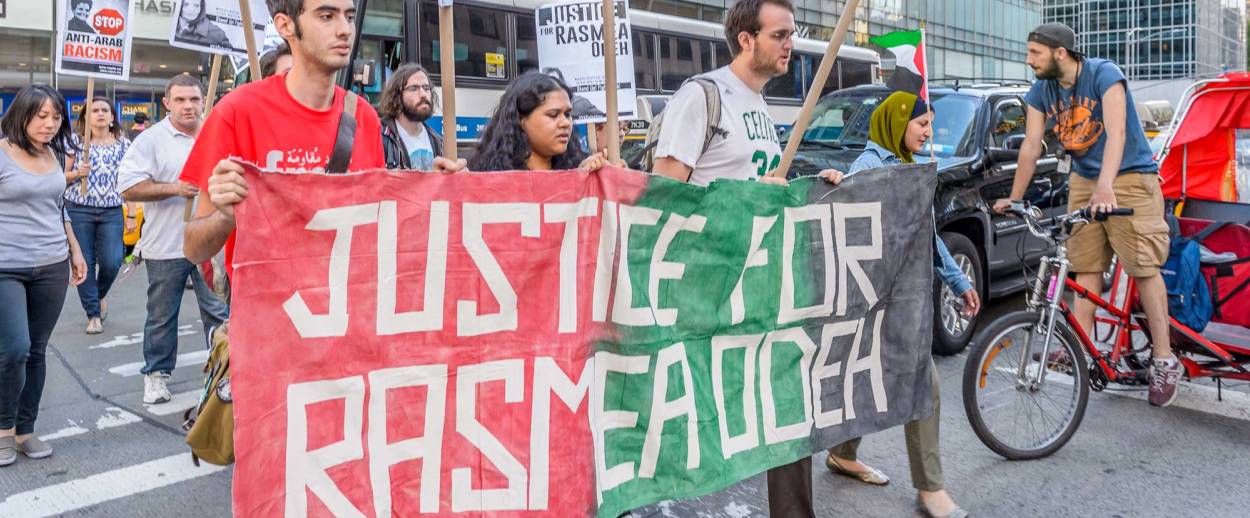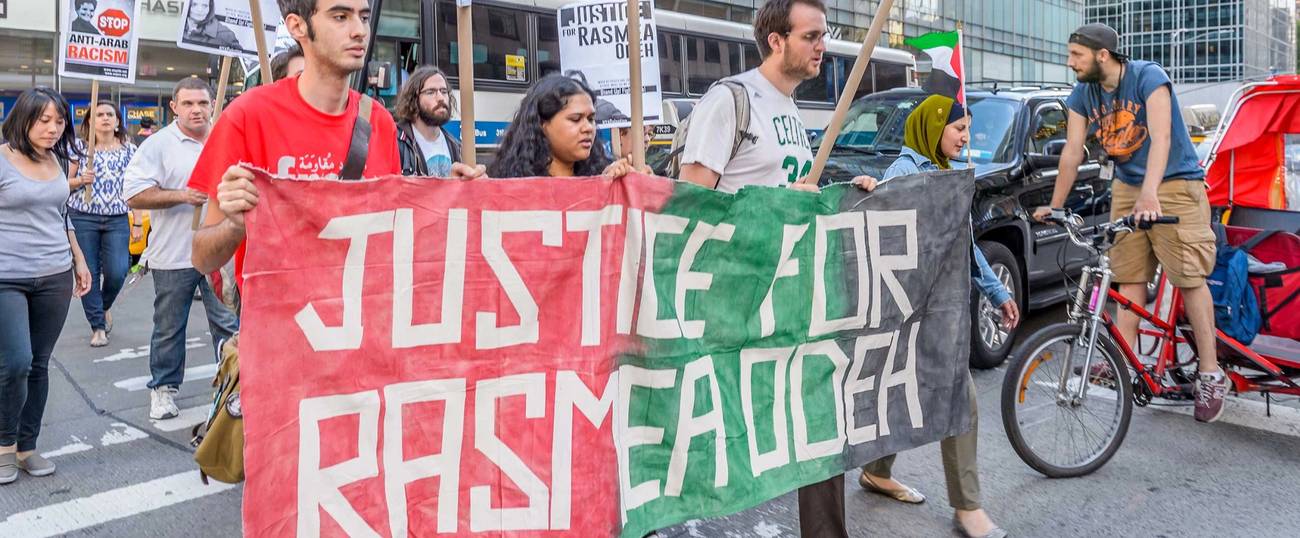A Test for the Anti-Trump Movement
Do Jews have to make common cause with people who want to kill them?




In the week leading up to the presidential election, like hockey players who refuse to shave during the playoffs, the women of the Weiss family lived in their “Pussy Grabs Back” T-shirts. For months, our family texts had buzzed day and night with emoji-laden reactions to the latest Trump outrage, while my mother waged a very personal campaign against the Republican candidate. When the first Tuesday in November was upon us, my dad, who has a giant poster of William F. Buckley in his office, bowed to shalom bayit and wrote in Steph Curry.
All of this camaraderie put me in a strange position. Since the crucible of my college years—in which being an outspoken Zionist made you fascist, supporting the war in Iraq made you an imperialist, and believing that some cultures are indeed more enlightened than others a hegemon—I’ve gotten used to feeling politically homeless. I’m typically the hardass among the squishes. All of a sudden, I found myself making common cause with those whom I disagree with vehemently on, say, the Iran deal (bad), the necessity of teaching Western Civ. (good), and most certainly Israel. It is the difference on the Jewish state that has been the starkest and the most painful, as anyone who has paid any attention to the increasingly leftward tilt of the Democratic Party will not be surprised to learn.
One of the rising stars of this new generation of progressive politicos is Linda Sarsour, who was honored as a “champion of change” by the Obama administration and is now one of the anti-Trump movement’s most visible leaders. Sarsour, a longtime Arab-American community organizer, was one of the heads of the Women’s March in Washington and is the named plaintiff in the high-profile lawsuit against Trump’s immigration ban. The image of her, hijab-clad and flashing a defiant smile, rivaled the pink knitted hat as the unofficial symbol of the march.
She is also a proudly outspoken supporter of BDS. “Nothing is creepier than Zionism,” she has tweeted, a remark that, along with the fact that in December she posed for a photo with a former Hamas operative, stirred a series of critical pieces on right-wing websites in the days following the march on the capital. Within hours, Sarsour’s newfound friends and supporters—do I even need mention that Mark Ruffalo and Susan Sarandon were among them?—burst forth with a social-media-driven campaign dubbed #IMarchWithLinda, in which the stories about her background and views were presented as vicious hatchet jobs by pro-Trump legions determined to slow the momentum of the anti-Trump brigades. Indeed, how could a woman who last week made headlines for organizing a fundraising drive that raised more than $56,000 to repair the desecrated Jewish cemetery in St. Louis harbor hostility to Jews?
Among those who have pledged allegiance to Sarsour are prominent Jewish leaders and rabbis. Criticism of the Muslim activist was nothing but “a deliberate smear campaign from the far right to delegitimize the march itself,” said Los Angeles Rabbi Sharon Brous, expressing the view of many other anti-Trump Jews. “This is a time for serious coalition-building, for standing beside other minority populations that are targeted. It is time for people to stand for and with each other. There will be in the mix a number of different perspectives. I don’t feel at all uncomfortable about that,” Brous has said. “A much greater problem would be if the Jewish community stepped out of activism because we’re afraid that someone on the stage has a position on BDS different than our own.”
This was something of a dodge, because, as Brous and others must know, Sarsour’s odious views aren’t limited to BDS, and stretch particularly into issues that directly relate to the systemic oppression of women. “You’ll know when you’re living under Sharia Law if suddenly all your loans & credit cards become interest-free. Sound nice, doesn’t it?” Sarsour tweeted about the Islamic law code that justifies beating women and considers the testimony of a woman half that of a man. She has also denigrated the anti-Islamist feminist Ayaan Hirsi Ali in astonishingly vulgar terms, insisting that Hirsi Ali is “not a real woman” and joking that she wishes she could take away Ali’s vagina—a particularly vicious bon mot, given that Hirsi Ali was well-known as a victim of genital mutilation in her native Somalia.
Still, anti-Trumpers argued, Sarsour’s personal imperfections didn’t come close to forcing Jews to disavow her and her movement. Echoing Brous, Yehuda Kurtzer, president of the Shalom Hartman Institute of North America, pushed back against those who use support of Israel as a single-issue litmus test. In a piece in the Jewish Journal, he made the case that American Jews should stick to what he dubbed the “two-thirds and 51 percent” rule: “We identify in political communities, or organize for particular causes, with people who share, or at least do not operate in contradistinction to, two-thirds of our core moral imperatives, and with whom we agree on a minimum of 51 percent of our moral concerns,” he writes. By this standard, Sarsour’s leadership role is not a deal breaker. “Rotten compromise, the kind we must not do,” wrote Kurtzer, “entails making common cause with evil.”
So what does boundary-crossing evil look like? Is it OK, for example, to support the civil rights of Palestinians, undocumented immigrants, and women who wear hijab while also calling for the denial of the national and indigenous rights of Jews, and rejecting the rights of women in Muslim-majority countries to control their own bodies? Is that a fair definition of Kurtzer’s 51-percent rule? If you call for the death of Zionists but support Palestinian nationalism, is being against Donald Trump the moral tie-breaker that makes you a legitimate ally of American Jews like me—and immune from our criticism? Kurtzer doesn’t say, but the assumption was that nothing had thus far emerged in the anti-Trump movement to meet the rotten compromise test.
That logic resonated with almost all the anti-Trump Jews I know, who either actively rallied around Sarsour, or—like me—held their tongues. I justified it by telling myself that no political movement is perfect, no coalition entirely pure. Opposing this president, I reasoned, is too critical a priority.
Now, unhappily, the anti-Trump movement has produced a leader far worse than Sarsour: a woman whose actions must surely qualify as evil. If they don’t, the problem doesn’t belong to Zionists or Jews, but to the movement itself—and even more so to the spiritual health of the political party angling to benefit from it.
***
The names Leon Kaner and Edward Jaffe are now lost to history, but Rasmea Odeh surely remembers them well. Kaner and Jaffe are the 21-year-old and 22-year-old who went to a Jerusalem supermarket on Feb. 21, 1969 to pick up food for a trip and were blown up thanks to a bomb that Odeh and an accomplice had placed there. Nine others were injured in the blast. Four days later, a second bomb that the duo planted exploded at the British Consulate. Odeh was sentenced to life in prison by Israel but was released in a prisoner exchange in the early 1980s.
This convicted terrorist has surfaced since the march on Washington as a new leader of the women’s movement, announcing its next global action in the pages of the Guardian: a worldwide women’s strike on March 8. Along with Angela Davis and several others, Odeh called for a day of “striking, marching, blocking roads, bridges, and squares, abstaining from domestic care and sex work, boycotting, calling out misogynistic politicians and companies, striking in educational institutions.” And the organizers of the Washington March followed Odeh’s lead, recently announcing their participation in this international “day without women.”
The political stupidity of embracing Odeh is plain. What better ammunition could there possibly be for a White House all too keen to dismiss a genuine grassroots movement as paid professional protestors and anti-American anarchists than the public participation of a bona fide terrorist? If the anti-Trump movement is going to stand for tolerance, genuine liberalism, civility, and decency—everything we disdain Trump for disdaining—Odeh and her ilk can have no place in it.
But there is a deeper, darker point here beyond strategy: It concerns the alarming cheapness of Jewish blood. A movement that has so much to say about the value of black lives, of transgender lives, of women’s lives, of Latino lives, of Muslim lives, of the lives of the disabled and the poor and the weak, but becomes mealy-mouthed and contingent about the lives of Jews when those Jews happen to live in the land of Israel should make any person of conscience question the sincerity of that movement.
Indeed, what’s perhaps even more disturbing is the increasing tendency on the part of Jews to silence themselves on these fundamental moral matters to fit in or to avoid accusations of being soft on Trump. On this, our leaders must do better, even though it will surely mean fewer likes and retweets from popular progressives. It’s incumbent upon those who assert themselves as representatives of the Jewish community not to paper over this disturbing hypocrisy—especially if what they are trying to do is convince amcha that it’s still in their best interest to be at the anti-Trump table.
Somehow it seems that Jews are always the ones being asked to check their identity at the door in movements driven by identity politics. We may assiduously follow the “two-thirds and 51 percent” rule, but our partners often do not. If asking for something so minimal—to disassociate and condemn a woman who murdered innocent Jews—seems impolite or greedy, then perhaps the compromise we have made is rotten.
***
You can help support Tablet’s unique brand of Jewish journalism. Click here to donate today.
Bari Weiss is the founder and editor of The Free Press and host of Honestly with Bari Weiss.